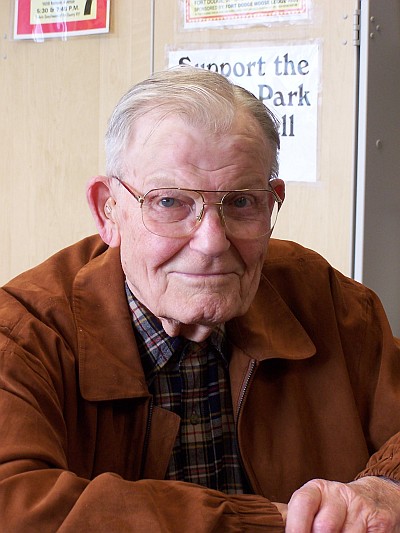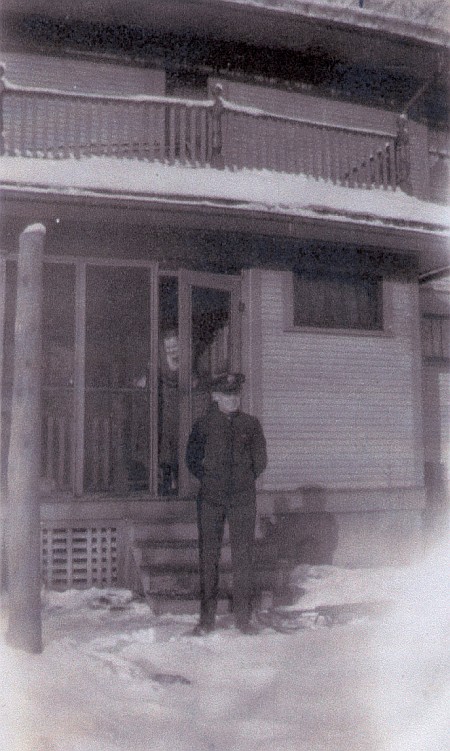 |
Arthur Edwards |
 |
Arthur Edwards |
I had an older brother, and when he was in high school he played trumpet in dance bands. He was ten years older than I, and when he went to optometry school the trumpet was home. There was a time I was in 6th grade when my sister was out of job and she was home giving some piano lessons. I took piano from her and got fairly good, but mother decided I ought to play an instrument other than the piano. I remember saying, "I'll just play the trumpet." Oh no, you're not! Oh no, you're not! So I was taken down to Anderson's Music Store on a Saturday night with no idea whatsoever. What am I going to play? Hummie Holmquist was working there, and Hummie was the one who waited on me and he picked this flute out. And that's what they decided on and they traded the trumpet in for a flute. It was a Conn flute. And so I started. Well, there was not a flute teacher in Fort Dodge. Nobody knew how to play it. Old Joe Kautzky, his was a Meyers flute, this was a Boehm [fingering system]. Through church, Mom knew Mrs. Spotvold, so they lined up Spotsvold [Haaken Spotvold was a clarinet player in the Karl King Band] to be my instructor and he taught me to play it. But he didn't use the finger chart so much, because I played all three octaves with the same fingering. I did that until I was a senior in high school. And then Miss [Lucille] Corey...she was the orchestra director... decided I have some lessons on this particular concert piece. She thought first of all, the flute ought to be overhauled; it ought to have new pads, because it was four or five years old. My dad was going down to Des Moines on some business and he took it down to Alonzo Leach. If I remember right, he was a flute player. He was going to overhaul my flute, but instead of that Dad brought home a William S. Haynes sterling silver flute; I think they were $265. So then I was supposed to go down there and take some lessons. I stood up there and played him the first introduction part of the 1812 Overture and he said, Oh no, that's enough. I can't do anything for you. Just like that! I can't do anything for you.
And I tell you, my mouth dropped down to my belt. Well, he he must have taken pity on me, because he did spend the rest of the hour teaching me the difference in tone. And he said, Go home and practice. And if you think you're doing any good, come back in a couple of months. And I quit everything! I was in the band at this time. I quit going to band. I quit going to orchestra. And I quit going to this, that, and the other thing and just worked at it. Imagine playing flute, even in the band with the wrong fingering. I was taught wrong, all octaves the same keying, and only when later on in my senior year getting ready for State Music contest, I took some lessons from Lon Leach in Des Moines. He corrected my fingering of the 3rd octave.
I think that as a high school student I was asked to try out for the Karl King Band because of a shortage of flute players. Only old Joe Kautsky was available, and he was quite old then and not always dependable. A Maurice Anderson later joined me for a two flute section. In those days we played three concerts in two weeks, at the square on Tuesday night and every other Friday at Oleson Park. Practice was two times per week. The first year I got $3.00 per concert, raised to $4.00 per concert the second year. Nothing for practice. So playing in King's band was a rather full time of music.
I did play a piccolo solo in 1933 or 1934, I think, at a concert at the square in the old bandstand - long gone now. At a break in this performance, Karl turned to me and said, You gained ten yards on me! I was playing football, also, at the time -- I think the Jr. College team.
Another time at a winter concert in the High School we were playing some overture, and the finish was a sharp bang -- rest -- bang. Only I did a bang -- bang -- bang, the only sound from the band during the rest period. Many years later, in the late 60's when I was farming, I met Karl going into the Post Office. His opening greeting was Was that a high G, or G sharp? What a memory!
Was Karl King a smoker? Many times I'd see him fumble in his pocked and pull out a cigarette. He'd put it in his mouth, but I never saw him smoke.
I have many memories of State Fair jobs. My first year King did not have the main (grandstand) job, but was given the job of playing in the grounds band stand and also for the horse show. Very boring! I went to sleep trilling a high G sharp.
The next year we were back in front of the grandstand because our replacement band hadn't been so good. We slept in the big tent and ate all meals on the grounds. After a week the food wasn't very good. Karl and Walt Engelbart had a separate small tent. I was told there was a good poker game there.

Arthur Edwards is pictured in 1933 wearing his band uniform
as he is leaving his house for a performance. His
sister, Dorothy, watches from the door.